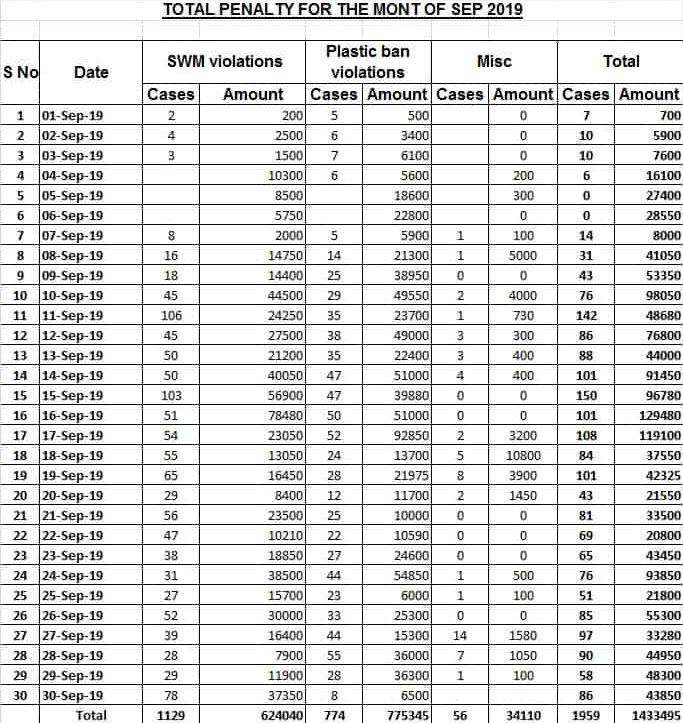It has been almost five months since ward marshals were appointed in the city to prevent public littering, but the piling up of garbage in places other than the designated ones raises questions about how effective the move has been. On its part, the Bruhat Bengaluru Mahanagara Palike (BBMP) holds that violations have come down after marshals started patrolling the wards.
The BBMP managed to convince the state government to appoint 232 marshals, to prevent random littering of streets, lakes, Indira canteens, landfills and other public spaces, at a cost of Rs 8.51 crore. Ward marshals were deployed from September, 2019.
Apart from 198 ward marshals who check littering, the BBMP has appointed 174 marshals for Indira Canteens, 16 marshals for Bellandur lake and 50 for the Bellahalli landfill, supervising works and other enforcement related activities.
The marshals were sourced through an MoU with the Karnataka Ex-servicemen Welfare Society (KEWS). Currently there are 198 marshals, one for each ward in the BBMP limits, to monitor littering and dumping.
A marshal’s work description involves penalising the public for violating the plastic ban, littering, urinating in public places and dumping commercial or meat waste.
“The government issued a work order to appoint 232 marshals making one marshal for each ward and 34 more marshals for the back up. We could appoint only 198,” says KEWS Chairman, Col. Rajbeer Singh.
| The KEWS, as per the BBMP’s condition is allowed to appoint ex-servicemen and National Cadet Corps (NCC) cadets in a 50:50 ratio. Marshals who are ex-service personnel are paid in a range of about Rs 24,000 a month whereas marshals who are NCC cadets earn up to Rs 18,000 a month. |
The marshals patrol from 5 am to 11 am. At night, they form groups of five for patrolling. However, the scarcity of men has been a challenge.
Says Col Singh: “While the morning patrolling can be easier for marshals as public who attempt to dump garbage shy away, during the night hours it is a challenge as the people who attempt to dump garbage come in large numbers and with a huge amount of garbage to dump. To prevent it, the marshals also have to go in a group.”
The ward marshals have been successful in slapping fines to the tune of Rs 63.42 lakh against violators from September 2019 to January 2020. September 2019 records the highest amount of fine-collection (Rs 14.33 lakh), followed by November (Rs 13.91 lakh).

Garbage marshals collected over Rs 14 lakh in fines last September
Marshals prevented from discharging duty
Marshals on the field say they are not being taken seriously by the public. They point out that they are being prevented from enforcing cleanliness.
For instance, in November 2019, a woman in Kamakshipalya filed a complaint with the police against a marshal for stopping her from dumping garbage in a public place. In another incident, a doctor who was caught red-handed by marshals while dumping waste from his car near Nandidurga Road, filed a complaint against the marshals.
Worse, the police questioned the marshals on the grounds that they were harassing the public. They were made to sit in the police station all day. The marshals were allowed to leave only when higher officials reprimanded the station’s staff.
Besides the public and the police, it is learnt that marshals are having to face attacks from local thugs. In one incident near Harishchandra Ghat in October, a marshal was stabbed by miscreants, revealed BBMP’s Joint Commissioner (SWM) Sarfaraz Khan.
Khan says: “If the police were cooperative, things would have gone better. Locals have been harassing the marshals by taking them to police stations and police have been giving them support. Every time, a Deputy Commissioner of Police (DCP) rank officer has had to come into the picture to have the marshals released.”
Henceforth, the BBMP plans to file cases against anyone obstructing marshals in their duties. Khan says, “From now onwards we will be filing complaints against those obstructing government work. Marshals have been given the rights and duty to enforce it and those who harass them will have to face the music.”
A marshal who does not wish to be identified says, “In most areas, the garbage contract is operated by corporators themselves. Those who commit SWM violations are either relatives or close aides of the corporators. If we catch them we will be questioned and there are many instances when the contractors have told us that our existence is only because them. If such political interventions are not there, we can ensure cleanliness of our wards that have been assigned to us.”
The BBMP Commissioner has to issue a stern warning that no corporator shall interfere in the work of Marshalls. In case it’s reported the ward will not have cleaning done abd corporator has to get it done by himself.
BBMP is to blame for this they have no services in the area Sarjapur road, Harlur, Hsr and others they never come to pick up the wastage. Where would people throw the garbage? Not even a single area in the Bangalore have proper drainage, water, garbage collecting facility.